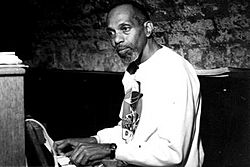Walter Bishop Jr. facts for kids
Quick facts for kids
Walter Bishop Jr.
|
|
|---|---|
 |
|
| Background information | |
| Also known as | Ibrahim ibn Ismail |
| Born | October 4, 1927 New York City, New York, U.S. |
| Died | January 24, 1998 (aged 70) New York City |
| Genres | Jazz |
| Occupation(s) | Musician |
| Instruments | Piano |
| Years active | 1940s–1990s |
| Labels | Black Lion, Prestige, Xanadu, Black Jazz, Muse, East Wind, Pony Canyon, Red, DIW |
| Associated acts | Milt Jackson, Stan Getz, Charlie Parker, Oscar Pettiford, Kai Winding, Miles Davis |
Walter Bishop Jr. (born October 4, 1927 – died January 24, 1998) was a talented American jazz pianist. He was known for his unique playing style and his contributions to the jazz world for over 50 years.
| Top - 0-9 A B C D E F G H I J K L M N O P Q R S T U V W X Y Z |
Early Life and Musical Beginnings
Walter Bishop Jr. was born in New York City on October 4, 1927. His father, Walter Bishop Sr., was also a composer. Growing up in Harlem, Walter Jr. was friends with other future jazz stars. These friends included Kenny Drew, Sonny Rollins, and Art Taylor.
Walter Jr. left high school early to play in dance bands. This helped him gain experience as a musician. From 1945 to 1947, he served in the Army Air Corps. During his time in the military, he met many touring bebop musicians. This was in 1947, when he was based near St. Louis.
Music Career and Teaching
After his military service, Walter Bishop Jr. returned to New York in 1947. He joined drummer Art Blakey's band for 14 weeks. He also recorded music with them. Walter Bishop Jr. improved his bebop playing by joining jam sessions. These sessions took place at a famous club called Minton's Playhouse.
He recorded with Milt Jackson and Stan Getz in 1949. Later, he played with jazz legends like Charlie Parker (from 1951 to 1954). He also performed with Oscar Pettiford, Kai Winding, and Miles Davis (from 1951 to 1953). In 1956, he recorded with Hank Mobley. At one point, he became a Muslim and used the name Ibrahim ibn Ismail. However, he did not use this name publicly for his music. In the early 1960s, he also led his own music group, a trio. This trio included Jimmy Garrison and G. T. Hogan.
In the late 1960s, Walter Bishop Jr. studied at The Juilliard School. He learned music theory there from Hall Overton. After his studies, he taught music theory at colleges. This was in Los Angeles during the 1970s. He also wrote a book called A Study in Fourths. This book was about jazz improvisation. It focused on using cycles of fourths and fifths in music.
In the 1980s, Bishop taught at the University of Hartford. He also played often at clubs and music festivals in New York. He continued to perform music into the 1990s.
Walter Bishop Jr. passed away on January 24, 1998. He died from a heart attack in Manhattan.
Playing Style
Walter Bishop Jr. was greatly influenced by the pianist Bud Powell early in his career. Later, Bishop became known for a special way of playing. He would "hold back on the beat." This means he would play slightly behind the main rhythm. This technique added excitement and tension to his music.
Albums as a Leader
Walter Bishop Jr. released many albums where he was the main artist. Here are some of them:
| Year | Title | Label | Notes |
|---|---|---|---|
| 1961 | Speak Low | Jazztime | A trio album with bass and drums. |
| 1962 | A Pair of "Naturals" | Operators | Another trio album. |
| 1963 | Summertime | Cotillion | A trio album. |
| 1971 | Coral Keys | Black Jazz | Mostly a quartet album with saxophone and flute. |
| 1973 | Keeper of My Soul | Black Jazz | Features flute, saxophone, and vibraphone. |
| 1974 | Valley Land | Muse | A trio album. |
| 1975 | Soliloquy | Seabreeze | A solo piano album. |
| 1976 | Solo Piano | Interplay | Another solo piano album. |
| 1976 | Old Folks | East Wind | A trio album. |
| 1977 | Soul Village | Muse | Features trumpet, saxophones, and guitar. |
| 1977–78 | Hot House | Muse | Some tracks are trio, some are quintet. |
| 1978 | Cubicle | Muse | Features many instruments, including trombone and saxophones. |
| 1988 | Just in Time | Interplay | A trio album. |
| 1989 | Ode to Bird | Interplay | A trio album. |
| 1990 | What's New | DIW | A trio album. |
| 1991 | Midnight Blue | Red | A trio album. |
| 1993 | Speak Low Again | Venus | A trio album. |
 | Anna J. Cooper |
 | Mary McLeod Bethune |
 | Lillie Mae Bradford |

